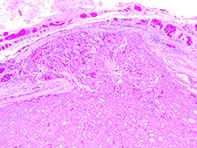Peer Reviewed
Feature Article Oncology
Thyroid cancer: an update
Abstract
Patients with thyroid cancer, a relatively uncommon malignancy, require comprehensive evaluation, multimodality treatment and long-term multidisciplinary follow up. Treatments include total thyroidectomy and adjunctive I-131 ablation therapy and long-term thyroxine suppressive therapy.
Key Points
- When thyroid nodules are detected, the challenge facing GPs is to distinguish patients with malignancy who require referral for surgical management from patients who have benign nodules that can be followed up nonsurgically.
- Although thyroid fine needle aspiration (FNA) is a sensitive and accurate diagnostic test, false-negative results do occur. Hence, if there are suspicious clinical findings from the history and/or examination that increase the probability of a nodule being malignant then these should override the FNA result.
- Surgery is the mainstay of treatment and total thyroidectomy is indicated in most patients. Radioactive iodine ablation and long-term thyroid stimulating hormone (TSH) suppression therapy are useful adjuvant therapies.
- GPs should be aware of the target TSH level set by the endocrinologist to avoid inadvertently reducing the thyroxine dose because of the mistaken interpretation that the TSH is too low.
- The increasing use of recombinant TSH is obviating the need for patients ceasing thyroxine and being rendered temporarily hypothyroid during investigation for residual or recurrent thyroid cancer.
- Patients with recurrent or progressive disease need comprehensive work-up and treatment in centres with expertise in treating thyroid cancer.
Purchase the PDF version of this article
Already a subscriber? Login here.

